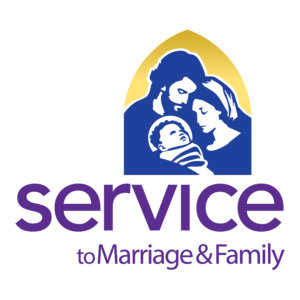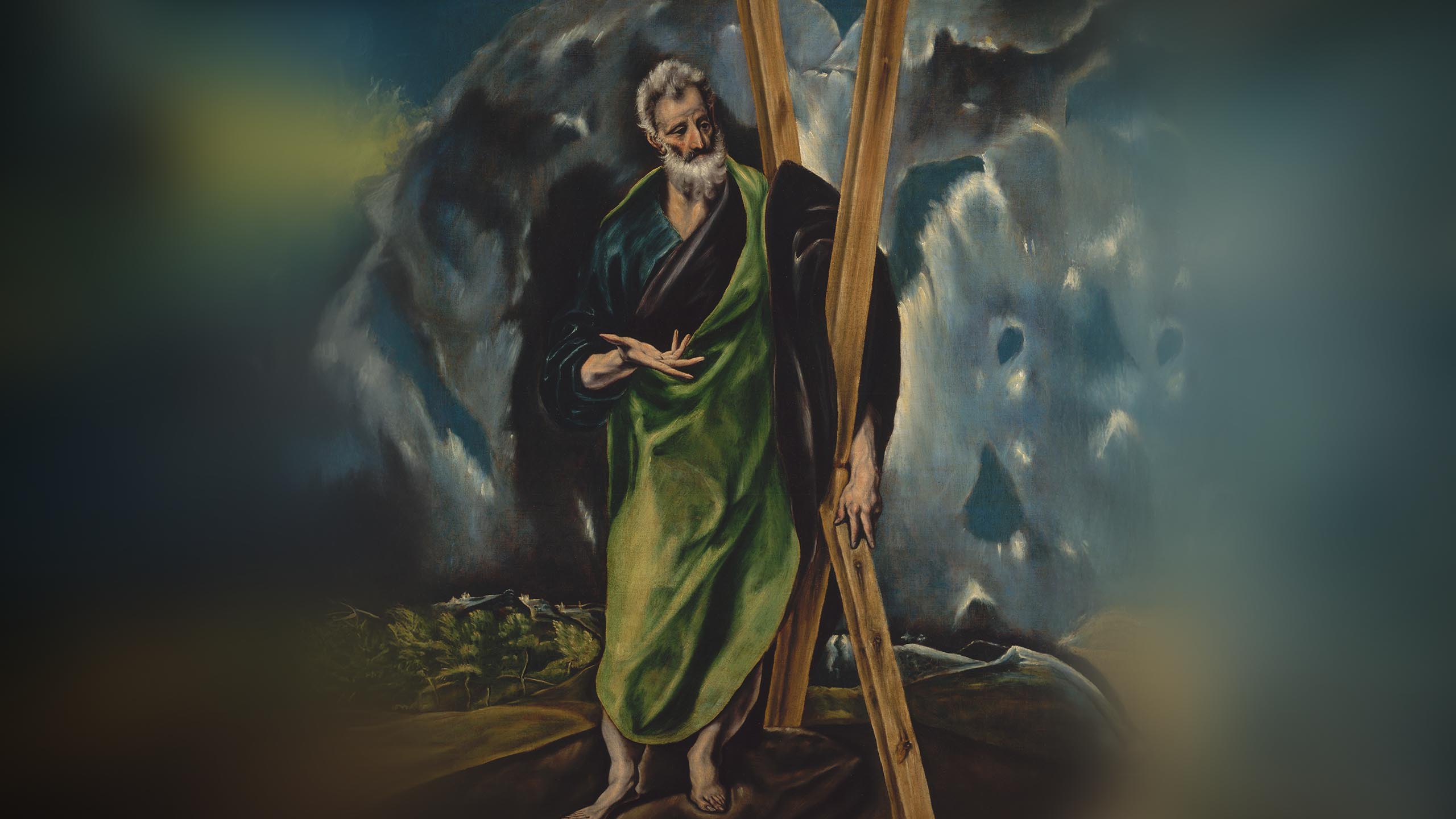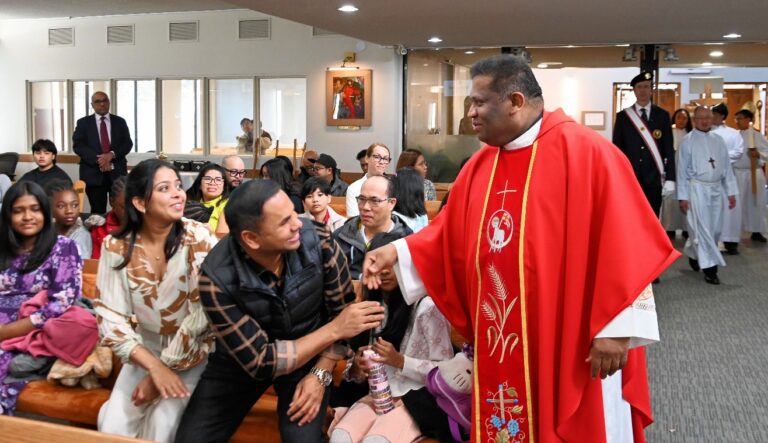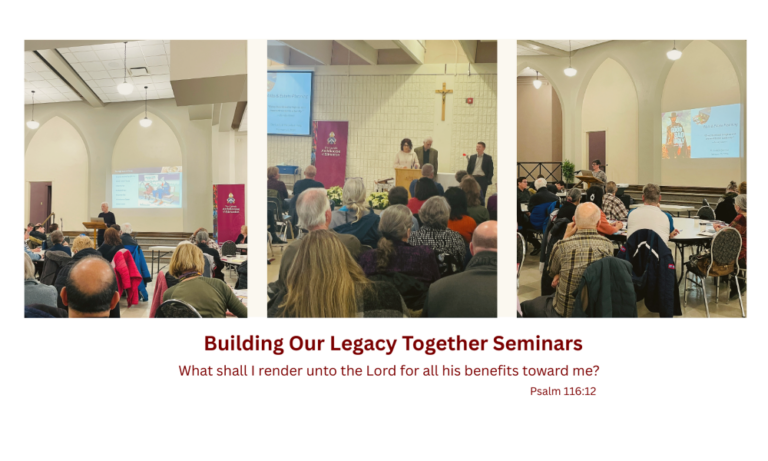On November 30th, the Church celebrates the feast of St. Andrew the Apostle. We read about St. Andrew in John 1: 35-41:
The next day again John was standing with two of his disciples; and he looked at Jesus as he walked, and said, “Behold, the Lamb of God!” The two disciples heard him say this, and they followed Jesus. Jesus turned, and saw them following, and said to them, “What do you seek?” And they said to him, “Rabbi” (which means Teacher), “where are you staying?” He said to them, “Come and see.” They came and saw where he was staying; and they stayed with him that day, for it was about the tenth hour. One of the two who heard John speak, and followed him, was Andrew, Simon Peter’s brother. He first found his brother Simon, and said to him, “We have found the Messiah” (which means Christ).
Although it may not seem obvious, St. Andrew can be a great saint for couples. First, St. Andrew is an example of someone who had the ability to be flexible with being St. John the Baptist’s disciple and then being the first of Jesus’s twelve apostles. This must have been a huge change for him from focusing on repentance and preparing for the Messiah with St. John the Baptist, to following the actual Messiah! Yet in St. John’s gospel, we see St. Andrew’s flexibility.

How often do you think you are on one path and then suddenly due to a change in circumstances, you are headed down a different path altogether. This could be a major change in jobs, retirement, a new baby, an accident, or a major illness. It could also be smaller changes, like plans changing, someone arriving home later or earlier than anticipated, a child having a meltdown, an unexpected deadline, or a delayed meal. During these times of change, it may be helpful to take a moment to adjust your expectations and increase your flexibility like St. Andrew. This could include taking time to stop and take some deep breaths, to acknowledge the change, to think about what you and others need to do given the circumstances, and then act accordingly. Change is a normal part of life and having the ability to be flexible with it can help. Can you imagine how St. Andrew’s life would have been radically different if he was not flexible about becoming one of Jesus’ twelve apostles and insisted on remaining St. John the Baptist’s disciple?
Second, St. Andrew showed us how he had the ability to listen to what St. John the Baptist said, was open to be influenced by St. John the Baptist to accept Jesus, said “yes” to follow Jesus, and confidently shared the good news of what he heard with others. Within your communication as a couple, these are great skills to practice: To be able to listen to what is said to you, to be open to accepting new ideas, thoughts or plans that are suggested, and to share news and experiences with your spouse. This type of communication allows both people to share their intimate thoughts and feelings, listen, and impact each other.
Research on marriage shows that accepting influence from your spouse is important, and paradoxically shows that the more you accept influence in your relationship, the more influence you have.[1] This is just like St. Andrew’s example of how he accepted a lot of influence from St. John the Baptist and Jesus, and in turn influenced countless people, one of whom was his brother, St. Peter. Although St. Andrew wasn’t doing this in a marriage, how can you do this within your marriage?
 There are three things you may do: First, you can ask yourself whether you are open to the perspective of your spouse.[2] When you are not, you can strive to be open to them. Second, let curiosity guide your listening by seeing if you have accurately understood what your spouse has said and asking them questions.[3] This can allow for greater understanding and respect for your spouse before jumping to conclusions about what you think they may have said. Third, seek to say “yes” to your spouse by seeing the valid perspectives your spouse has and sharing your acceptance with them even if you don’t fully agree.[4] Even sharing a partial “yes” may assist in being open to each other. Now this is not always easy, but if you are both seeking to doing this, it can positively impact your communication by feeling seen and heard by one another.
There are three things you may do: First, you can ask yourself whether you are open to the perspective of your spouse.[2] When you are not, you can strive to be open to them. Second, let curiosity guide your listening by seeing if you have accurately understood what your spouse has said and asking them questions.[3] This can allow for greater understanding and respect for your spouse before jumping to conclusions about what you think they may have said. Third, seek to say “yes” to your spouse by seeing the valid perspectives your spouse has and sharing your acceptance with them even if you don’t fully agree.[4] Even sharing a partial “yes” may assist in being open to each other. Now this is not always easy, but if you are both seeking to doing this, it can positively impact your communication by feeling seen and heard by one another.
Finally, there is a tradition that exists of the St. Andrew Christmas Novena, which is prayed starting on November 30th, the feast day of St. Andrew, until Christmas Eve in preparation for Christmas. It is a prayer that has been said for over a hundred years and is believed to have started in Ireland.[5] Even though you are not praying for the intercession of St. Andrew, this novena is associated with him since it starts on his feast day, at the beginning of the liturgical year, especially given that St. Andrew was the “first chosen” apostle of Jesus.[6]
The Archdiocese of Edmonton’s third pastoral priority is of “Formation for Service to Families and Marriage” by concentrating on “how we are a faith community that accompanies families, fully recognizing the centrality of marriage and family in God’s plan.”[7] As we are nearing the start of Advent, it is a good time to be reminded of how Jesus was born within a family with St. Joseph and the Blessed Mother Mary, which shows us the importance of marriage and family. Throughout this time of focus on the pastoral priorities, what are some ways that you can be of service, or learn to be of service, to families and marriage within your life and community?
One idea could be to pray the St. Andrew Christmas Novena for families and marriages and to pray for a specific intention within your marriage. This novena is supposed to be prayed 15 times a day, either all at once or spread out throughout the day, for 25 days.[8] However, if that feels too overwhelming, you could pray it once a day, or even work your way up by increasing the number of times you pray it every day or every second day to avoid taking an all-or-nothing approach with the novena. As this article comes to an end, let us pray with the St. Andrew Christmas Novena prayer:
Hail and blessed be the hour and moment
in which the Son of God was born
of the most pure Virgin Mary,
at midnight, in Bethlehem, in piercing cold.In that hour vouchsafe, I beseech Thee,
O my God, to hear my prayer and grant my desires,
(mention your request)
through the merits of Our Savior Jesus Christ,
and of His Blessed Mother. Amen.
–Melissa Guzik is a Registered Psychologist who works in private practice in the Greater Edmonton area. Melissa works with Catholic couples to help them have marriages that are both fulfilling and pleasing to God. Melissa has been married since 2002 and has four children. She is the co-author of the Catholic marriage enrichment book and workbook To Know, Love and Serve: A Path to Marital Fulfilment. Information about Melissa’s private practice can be found at www.melisssaguzik.com




